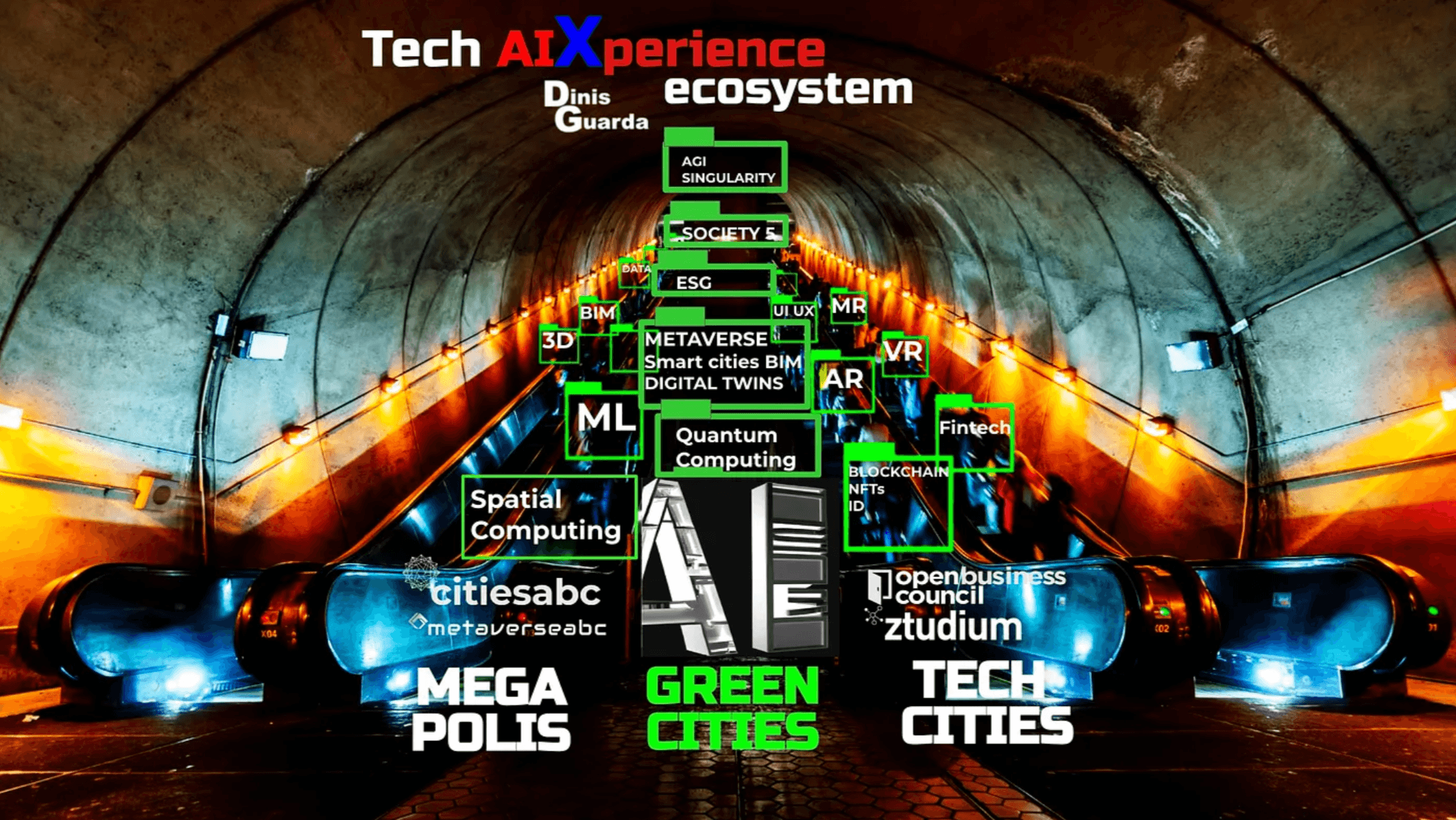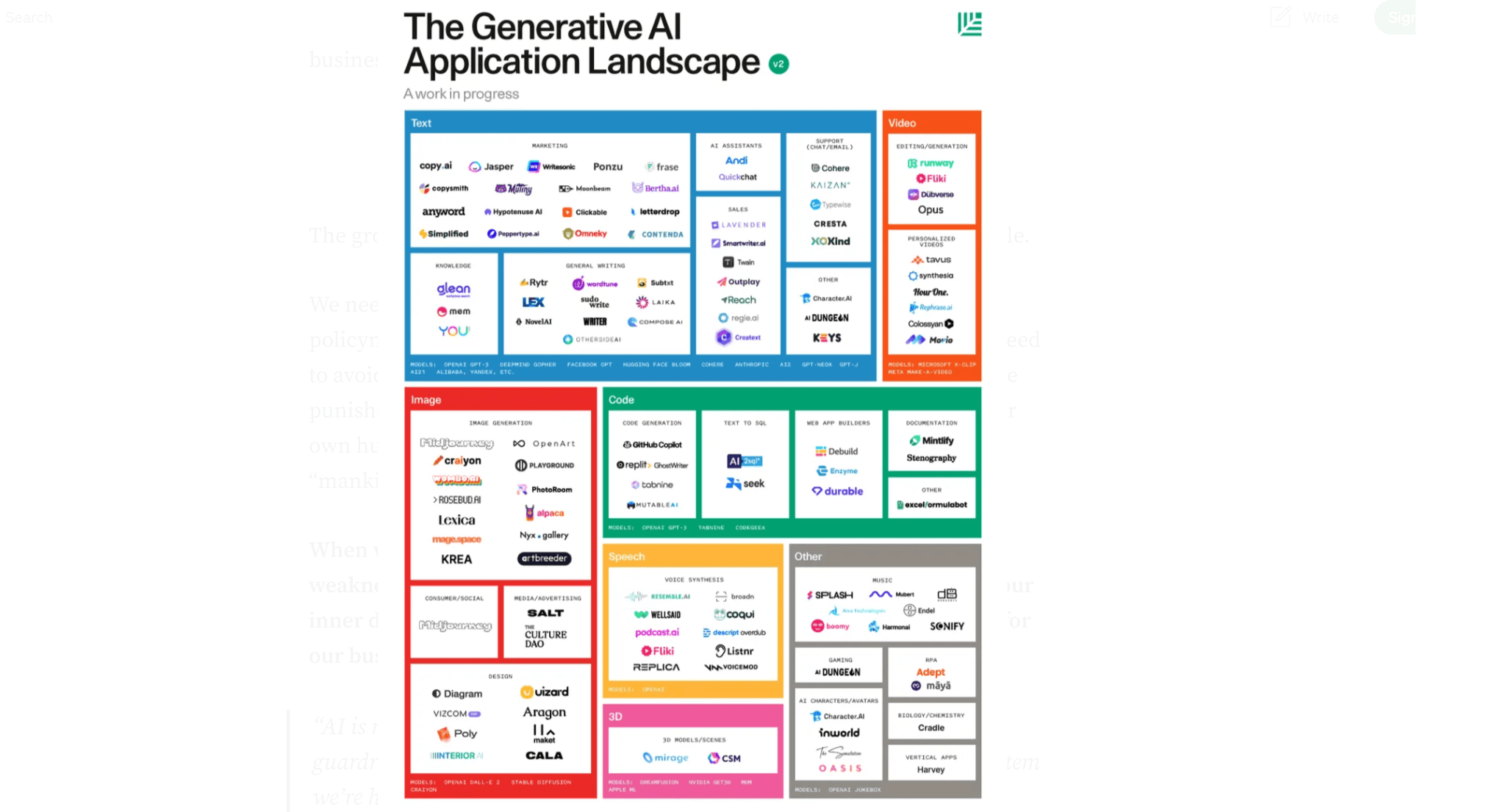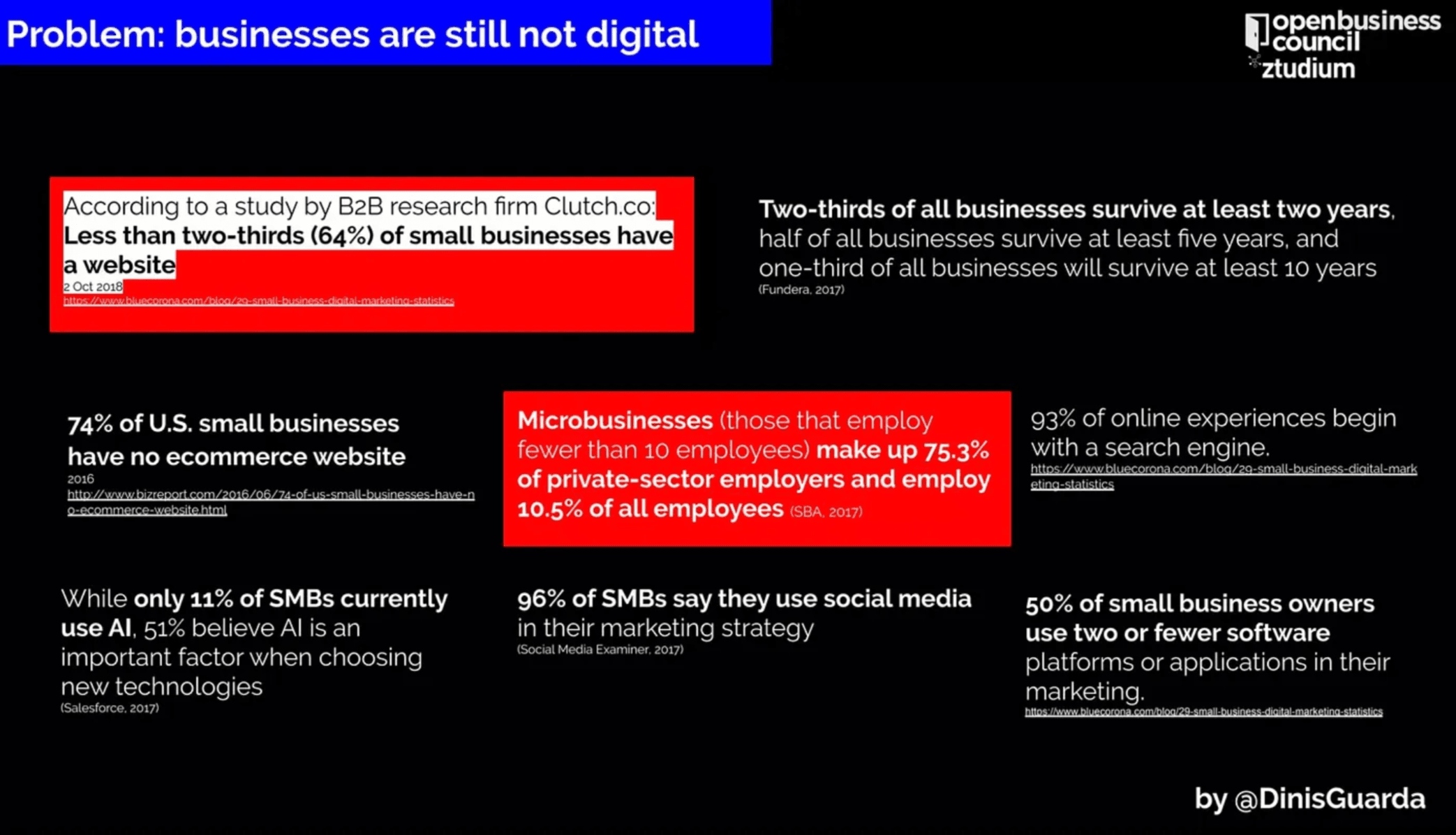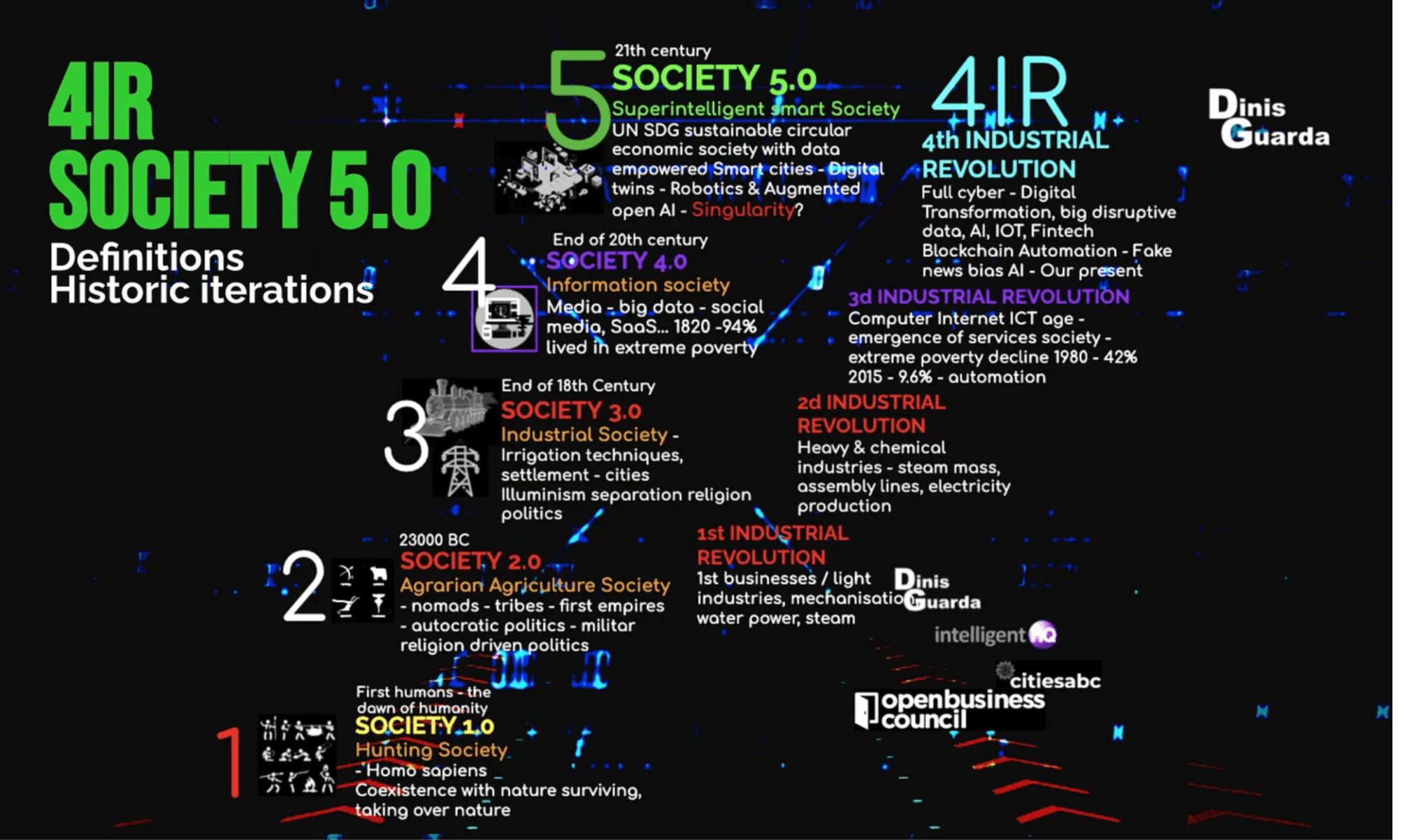open innovation
AI Xperience Evolution Ecosystem
13 Nov 2023, 2:16 pm GMT
Artificial Intelligence (AI) and Spatial Computing have emerged as the architects of our new reality—the Metaverse. This groundbreaking fusion is not just a technological evolution; it's a paradigm shift in the way we perceive and engage with the digital landscape. As we delve into this uncharted territory, it becomes evident that the synergy between AI and Spatial Computing is redefining our Human Interface eXperience, opening doors to unprecedented possibilities and transforming the very fabric of our virtual existence.
Life is about experiences. It is about living and interacting. What does it mean to be Humanity when we reengineer ourselves as AI? Can we manage and regulate AI urgently as it becomes our human Xperience and before the genius is totally out of the box?
Artificial Intelligence is now playing a pivotal role in the development of our next stage of humanity as digital transformation plays its role in everything we do in society and in the bridge between physical and digital twins. This is the functioning augmented spatial computing world where we will evolve as Humans in an AI Xperience Metaverse. As these set of technologies and tools evolve our human capacities will enable various capabilities that enhance our humans user experience, automates all our processes, and creates intelligent virtual physical environments. It creates also a new history where humans and its advanced new evolutionary machines will pay a new co-existence role.
This quote by Max Tegmark in the seminal book Life 3.0 explains the complexity and challenges when it comes to humans and machines:
“The robot misconception is related to the myth that machines can’t control humans.Intelligence enables control: humans control tigers not because we’re stronger, but because we’re smarter. This means that if we cede our position as the smartest on our planet, it’s possible that we might also cede control.”
Are we Prometheus, the Greek Titan, supreme tricksters, are we behaving as some kind of gods of “fire” = tech, are we now the creators of AI, a new evolutionary humanity from the clay of ourselves?
Most of AI top companies and fathers of artificial intelligence are admitting they partly lost already control on the velocity of the tools that came out of this great set of tech. Now the challenge is how society, business leaders can leverage the innovation of these powerful tools to empower humanity and businesses.

The landscape of AI eXperiences
The landscape of AI eXperiences is exploding as the world economy moves to AI. The number of organisations and companies working on this is growing exponentially and we have a responsibility to learn and work on this ecosystem all of us.
Our AI eXperiences comprehends the multiple iterations of tech spatial computing metaverse ecosystem.
This includes the following layers:
1. 360 digital Xperience
2. Digital Twin Discovery
3. Creator Gig Economy
4. Spatial Computing
5. Open APIs scale models
5. Human Machine UI UX
6. Data infra-architecture
AI is now mainstream with its iteration of Generative AI that derives its moniker from an advanced capability to create extremely powerful outputs such as chatbots, images, texts, and audios based on advanced language data models they have been trained on.
The recent breakthroughs are breaking the barriers of humanity — as AI models can now replicate most of the areas that are unique to humans — from art, videos, programming, writing, gaming, and even biology and chemistry to astronomy — AI models are creating passion, panic and sparking revolutions in every part of the human interaction, society, business and in general our human’s daily lives.

Image credit: Sonya Huang, Sequoia Capital
The growing landscape is now overwhelming changing society as a whole.
We need to act and work with all society, special governments, policymakers, universities and special business peers and leaders. We need to avoid that Humanity, goes in the direction of Prometheus and avoid be punished by Zeus or some destiny design because we stole the fire of our own humanity to give back to the AI new forms of our very own new “mankind” creation?
When we recognise this with responsibility look at AI strengths and weaknesses and special threats and opportunities in the eyes we start our inner direction to a better world and solutions, ethical considerations for our businesses and organisations.
“AI is not a race, it’s a journey. We need to take care, slow down, put in guardrails and the right checks and mitigations so that we have an AI system we’re happy with that is actually operating safely.” Kush Varshney, Distinguished Research Scientist & Senior Manager, IBM Research
As we look at AI we have to start designing new working habits and society, work strategies. This will include Education, reshaping our physical, organic and business experiences and special how we scale our human interactions and models.
“What we design, will in turn design us back.“
This sentence, used in ontological design explains this very well. What happens to us, when the tools we build modify us ? Who do we become?
Emotional intelligence is the very human multifaceted set of skills that sets humanity apart from the machines–and it’s not just an idea — abstract concept. It’s part of what defines Humanity powerhouse in the nature of earth and humanity and what fuels human success in society and our interaction as civilisation and all the socio economic models.
Emotional intelligence (EI) is often defined as the very human ability to engage with our high values of perceive, use, understand, manage, and handle our human DNA emotions. EI encompasses not only being in touch with your own humans feelings, organic, physical mental but also empathising and effectively communicating with other humans. And the challenge with humanity is that very few of us can manage Human Emotional Intelligence that changes with cultural, education, intrinsic human nature and religion or the “operating systems” of our own cultural backgrounds. In EI there is surprisingly most of the times a little use of the word “social” and a considerable amount of the word “me” in how we are perceived in society and this has been a challenge with the internet and its evolution with the social web and social media.
Thanks to the wonders of the social internet and its iterations of social media data models, we humans mastered the art of physical and digital curating and managing our lives, and engaging with new digital transformation models that includes views, likes and comments. This creating new physical human to human and human to machine empathy and new digital enable human emotional intelligence.
AI fast growing Emerging large language models (LLMs) are now exhibiting impressive performance across human emotional intelligence and the very various tasks, including reasoning, natural language processing and generation, and STEM problem-solving, making them one of the most promising research endeavours toward artificial general intelligence. This opens a pandora box of new possibilities and special major challenges on how we will be evolving with our emotional intelligence and the digital transformation of society as a whole, from the very fabrics of our tribes, our education models and special the social economic physical digital models.
These new tools and related LLMs coming from AI will create new models around the perception of work and the new models of Gig Economy, Creative Economy, Sports Wellbeing Economy and specially the interaction of Human to Human, Human to Machines and Machines to Machines that augment our humanity as we speak managing billions of human enabling tasks.

The challenges to add to the velocity of AI and tech is that the digital transformation models we need for the new AI empowered society are still not even close to most of the present civilisation. Humanity as a whole lacks digital transformation capacities. Not even close to artifical intelligence skills. This of course will create major challenges for society and will create a major digital divide that will create further issues on how Humanity will evolve in next decades.
While humans struggle with digital transformation AI LLMs such as GPT-4 or Pi from Inflection (Pi helps organise thoughts, make clear plans and act on them — whether you’re changing jobs, trying to get healthier, or learning a new skill) are starting to carry out several very human complex tasks devised by us women and men. And in all cases now overwhelmingly surpass human capacities in most of them.
AI LLMs most advanced models ChatGPT and Pi are shifting the very fabric of AI. AI Open AI ChatGPT does not have the same level of design personality as Inflection Pi. ChatGPT model is more likely to generate factual and objective responses, while Pi is much more likely to generate responses that are personal and engaging.
Recent studies suggested that LLMs can now also show remarkable potential toward AGI and emotional intelligence. However, it is still unknown whether these LLMs can interpret our human psychological emotional impulses, a fundamental benefit of humans that helps them improve their problem-solving abilities.
Researchers and major global universities and organisations are now pushing this boundaries using in-context learning methods, several academics that have made huge strides in various areas. This implies that human and AI are now partly at the same level as given the differences in their capacities, even if not all LLMs will benefit equally from the currently available methods they are progressing and improving. Recent research has shown evidence that LLMs can recognise and process very human emotional cues. These studies have not yet assessed whether or not LLMs’ emotional intelligence plays a significant impact in improving their performance but there are significant advanced in this area.
This will shift how we behave as humans and our very human history and society. The story of human 5 iterations of societies we can elaborate and all our past inventions up to the internet are widely known. Most of those inventions were previewed by futurists and sci-fi writers and visionaries looking towards the future.
At the present the so called 4IR and Society 5.0 are opening a new narrative about what makes us humans. My research in this level and the following infographic highlights the possibilities and the important moment we are in our evolutionary stage and history as society.

Can we design a super human society or a human mass extinction as AI replaces and scales the best and very important worst of us as humans?
Polish writer Stanislaw Lem, 1950 whose predictions were highly accurate, described many technological solutions years in advance. E-books and tablets, smartphones, Google and even ‘The Matrix’ were all conceived in the mid-20th century. Lem also predicted the internet as the possibility of connecting powerful computers in order to enhance their computing capacity. In his publication Dialogues, from 1957, he considered it a realistic direction of development that the gradual accumulation of ‘informatic machines’ and ‘banks of memories’ would lead to establishing ‘state, continental and, later, planetary computer nets’.
But now, we are on the verge of a new world fostered by something never seen in humanity. With the advent of the AI driven Society 5.0 and its 4IR — fourth industrial technology and its different technologies, some of which hold a strong disruptive potential, the pace at which our world changes has accelerated.
"Artificial intelligence is not a substitute for human intelligence; it is a tool to amplify human creativity and ingenuity.”– Fei-Fei Li, Co-Director of the Stanford Institute for Human-Centered Artificial Intelligence and IT Professor at the Graduate School of Business
The most important technology marking this new century and human history is Artificial Intelligence; it promises to influence and transform humanity as deeply as the Internet in the 1970s and 1980s, the fire or indeed humans.
Artificial Intelligence is leading to important evolutions in augmented and virtual reality technologies, the ones mostly used in the metaverse environments we increasingly use. Some call this new shift, the spatial internet, spatial computing. These are being adopted by a larger section of the population and leading to the emergence of new ways of communicating, doing business, playing, learning, being, relating.
“The end of human history. Not the end of History, the end of human controlled history.” - Yuval Noah Harari
Are we on the cusp of transitioning to a new ideation of what it means to be human?
Yes we are, and we have done so before… with the invention of fire, the alphabet, farming, the printing press, the assembly line, computers, the nuclear bomb! Humans have been going around for 4,000 years and at the moment we are in a moment where we are redesigning what it means to be human and our own evolutionary path.
As we move to this new moment of human development eduction, regulation, policy making and special creating awareness, studying ethical directions for AI and 360 related technology directions are the most important thing we need to consider! All of us — business leaders, policymakers, citizens have a responsibility to manage the biggest tech shift in human History.
The universe is never ending change and mutation. Life is the process of managing thinking and engineering action.
“Each new wave of technology is an opportunity for radical social change. Grasp it. Redefine what’s possible.” Mustafa Suleyman
AI needs to be and offer Humanity a new sustainable AIXperience evolution of humanity. But humans needs to lead this evolution not be a collateral loss in this new AI Xperience (r)evolution.
Sources:
Histomap: Visualizing the 4,000 Year History of Global Power https://www.visualcapitalist.com/histomap/
Tegmark, Max (2017). Life 3.0 : being human in the age of artificial intelligence (First ed.). New York: Knopf. ISBN 9781101946596. OCLC 973137375
Harari, Yuval Noah (2017–09–22). “Life 3.0 by Max Tegmark review — we are ignoring the AI apocalypse”. The Guardian. ISSN 0261–3077. Retrieved 2017–10–20.
The Coming Wave: Technology, Power, and the Twenty-First Century’s Greatest Dilemma Hardcover — 5 Sept. 2023 by Mustafa Suleyman (Author), Michael Bhaskar
Everything you should know about AI models https://dataconomy.com/2023/04/04/best-ai-models-types-how-to-choose-what-is/
Microsoft Researchers Unveil ‘EmotionPrompt’: Enhancing AI Emotional Intelligence Across Multiple Language Models https://www.marktechpost.com/2023/11/09/microsoft-researchers-unveil-emotionprompt-enhancing-ai-emotional-intelligence-across-multiple-language-models/
Google’s DeepMind Co-founder: AI Is Becoming More Dangerous And Threatening! — Mustafa Suleyman https://www.youtube.com/watch?v=CTxnLsYHWuI
Mustafa Suleyman & Yuval Noah Harari -FULL DEBATE- What does the AI revolution mean for our future? https://www.youtube.com/watch?v=7JkPWHr7sTY
Can AI be a Trusted Consultant to Help Humanity Redesign Our Economy and Political Landscape by Justin DiGiulio https://www.linkedin.com/pulse/can-ai-trusted-consultant-help-humanity-redesign-our-economy-justin/?trk=article-ssr-frontend-pulse_more-articles_related-content-card
Unlocking AI for Business: A Guide to IBM watsonx, https://medium.com/@sabine_vdl/unlocking-ai-for-business-a-guide-to-ibm-watsonx-734c633f21d2
Share this
Dinis Guarda
Author
Dinis Guarda is an author, entrepreneur, founder CEO of ztudium, Businessabc, citiesabc.com and Wisdomia.ai. Dinis is an AI leader, researcher and creator who has been building proprietary solutions based on technologies like digital twins, 3D, spatial computing, AR/VR/MR. Dinis is also an author of multiple books, including "4IR AI Blockchain Fintech IoT Reinventing a Nation" and others. Dinis has been collaborating with the likes of UN / UNITAR, UNESCO, European Space Agency, IBM, Siemens, Mastercard, and governments like USAID, and Malaysia Government to mention a few. He has been a guest lecturer at business schools such as Copenhagen Business School. Dinis is ranked as one of the most influential people and thought leaders in Thinkers360 / Rise Global’s The Artificial Intelligence Power 100, Top 10 Thought leaders in AI, smart cities, metaverse, blockchain, fintech.
previous
Chris J. Davis, CTO Of Film.io On The Future Of Decentralised Filmmaking With Dinis Guarda
next
4 Tips to Keep Your Business Safe for Workers and Customers